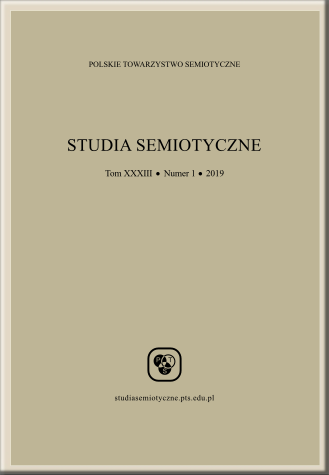Abstrakt
DOI: http://doi.org/10.26333/sts.xxxiii1.05
This article develops a conception of linguistic meaning that treats it as an attitude on the part of language users towards pairs of expressions. As with propositional attitudes, these meaning attitudes are subject to being deliberately altered over time by language users, with the aim of maximizing the efficiency of their language use. Therefore, meaning attitudes can be justified or refuted in practical terms. Our instrumentalist-coherentist approach, which allows for meanings to be advocated for alongside beliefs, provides a viable theory of justification of that kind. This view fits better with the evolutionary nature of linguistic phenomena, and resolves the problem of substitutability in opaque contexts.
Bibliografia
Beth, E. W. (1953). On Padoa’s Method in the Theory of Definition. Indigationes Mathematicae, 15, 330–339.
BonJour, L. (1985). The Structure of Empirical Knowledge. Cambridge: Harvard University Press.
Brandom, R. B. (1994). Making It Explicit: Reasoning, Representing and Discursive Commitment. Cambridge, Mass: Harvard University Press.
Charles, D. (2000). Aristotle on Meaning and Essence. Oxford: Clarendon Press.
Davenport, W. (1960). Jamaican Fishing: A Game Theory Analysis. New Haven, Connecticut: Human Relations Area Files Press.
Dewey, J., Bentley, A. F. (1945). A Terminology for Knowings and Knowns. The Journal of Philosophy, 42(9), 225–247.
Fodor, J. A., Lepore, E. (2001). Brandom’s Burdens. Philosophy and Phenomenological Research, 63(2), 465–482.
Glüer, K., Pagin, P. (1998). Rules of Meaning and Practical Reasoning. Synthese, 117(2), 207–227.
Goble, L. (1967). A Coherence Theory of Meaning. (Ph.D. dissertation, University of Pittsburgh, Pennsylvania).
Grice, P. (1957). Meaning. The Philosophical Review, 66(3), 377–88.
Grice, P. (1975). Logic and Conversation. In: D. Davidson, G. Harman (Eds.), The Logic of Grammar (pp. 64–75). Encino, CA: Dickenson Publishing Company.
Grice, P. (1978). Further Notes on Logic and Conversation. In: P. Cole (Ed.), Syntax and Semantics 9: Pragmatics (pp. 183–97). New York: Academic Press.
Hintikka, J. (1989). The Role of Logic in Argumentation. Monist, 72(1), 3–11.
Hintikka, J., Sandu, G. (2007). What is Logic? In: D. Jacquette (Ed.), Handbook of the Philosophy of Logic (pp. 14–39). Amsterdam: Elsevier.
Horwich, P. (1997). Implicit Definition, Analytic Truth, and Apriori Knowledge. Noûs, 31(4), 423–440.
Horwich, P. (1998). Meaning. Oxford: Clarendon Press.
Horwich, P. (2005). Reflections on Meaning. Oxford: Clarendon Press.
Kline, M. (1980). Mathematics: The Loss of Certainty. New York: Oxford University Press.
Lewis, D. (1969). Convention. A Philosophical Study. Harvard: Harvard University Press.
Macbeth, D. (2010). Inference, Meaning, and Truth in Brandom, Sellars, and Frege. In: B. Weiss, J. Wanderer (Eds.), Reading Brandom: On Making It Explicit (pp. 197–212). New York: Routledge.
Meillet, A. (1905). Comment les Mots Changent du Sens. L’année Sociologique, 10, 1–38.
Misak, C. (2014). Language and Experience for Pragmatism. European Journal of Pragmatism and American Philosophy, 6(2), 28–39.
Modrak, D. (2001). Aristotle’s Theory of Language and Meaning. New York: Cambridge University Press.
Peregrin, J. (2009). Inferentialism and the Compositionality of Meaning. International Review of Pragmatics, 1(1), 154–181.
Pietarinen, A.-V. (2006). Signs of Logic: Peircean Themes on the Philosophy of Language, Games, and Communication. Dordrecht: Springer.
Pietarinen, A.-V. (2014). Logical and Linguistic Games from Peirce to Grice to Hintikka. Teorema: Revista Internacional de Filosofía, 33(2), 121–136.
Quine, W. V. O. (1948). On What There Is. The Review of Metaphysics, 2(5), 21–38.
Quine, W. V. O. (1951). Two Dogmas of Empiricism. The Philosophical Review, 60(1), 20–43.
Quine, W. V. O. (1964). Implicit Definition Sustained. The Journal of Philosophy, 61(2), 71–74.
Quinton, A. (1975). The Presidential Address: Social Objects. Proceedings of the Aristotelian Society, 76, 1–27+viii.
Searle, J. R. (1969). Speech Acts: An Essay in the Philosophy of Language. Cambridge: Cambridge University Press.
Searle, J. R. (1983). Intentionality: An Essay in the Philosophy of Mind. Cambridge: Cambridge University Press.
Sellars, W. S. (1948). Realism and the New Way of Words. Philosophy and Phenomenological Research, 8(4), 601–634.
Sellars, W. S. (1953). Inference and Meaning. Mind, 62(247), 313–338.
Szubka, T. (2010). On the Very Idea of Brandom’s Pragmatism. Philosophia, 40(1), 165–174.
Ullmann, S. (1957). The Principles of Semantics (2nd ed.). Glasgow: Jackson. Oxford: Basil Blackwell.
Ullmann, S. (1962). Semantics: An Introduction to the Science of Meaning. Oxford: Blackwell.
Vanderveken, D. (2011). Formal Semantics for Propositional Attitudes. Manuscrito, 34(1), 323–364.
van Fraassen, B. C. (2011). Logic and the Philosophy of Science. Journal of the Indian Council of Philosophical Research, 27, 45–66.


